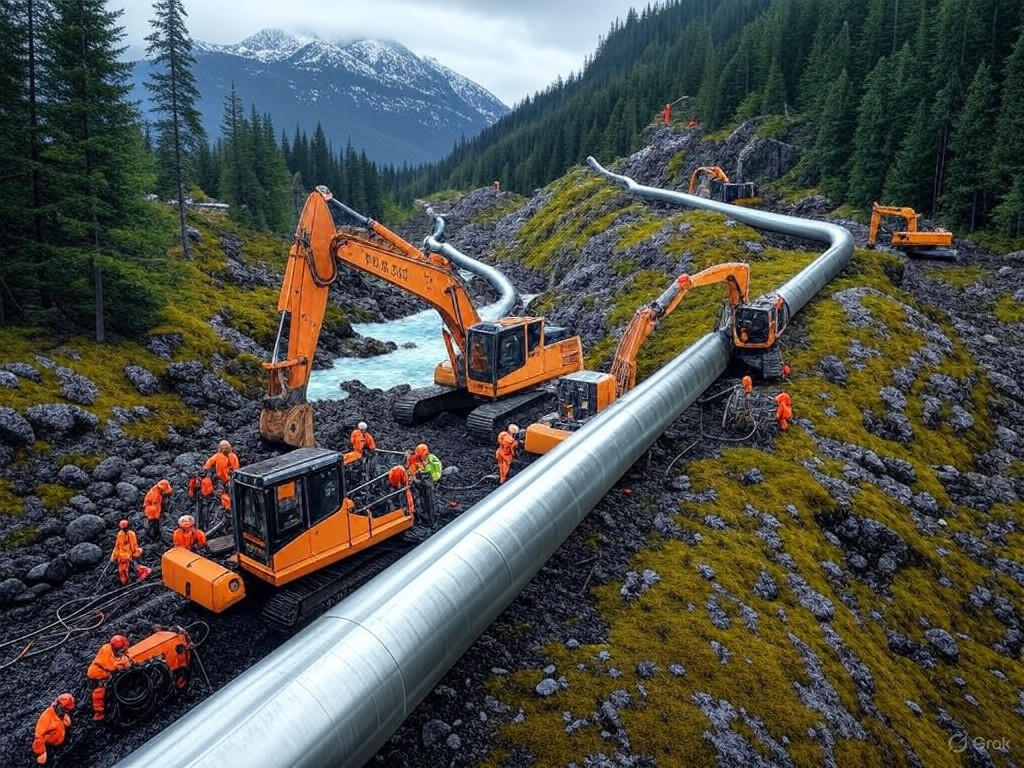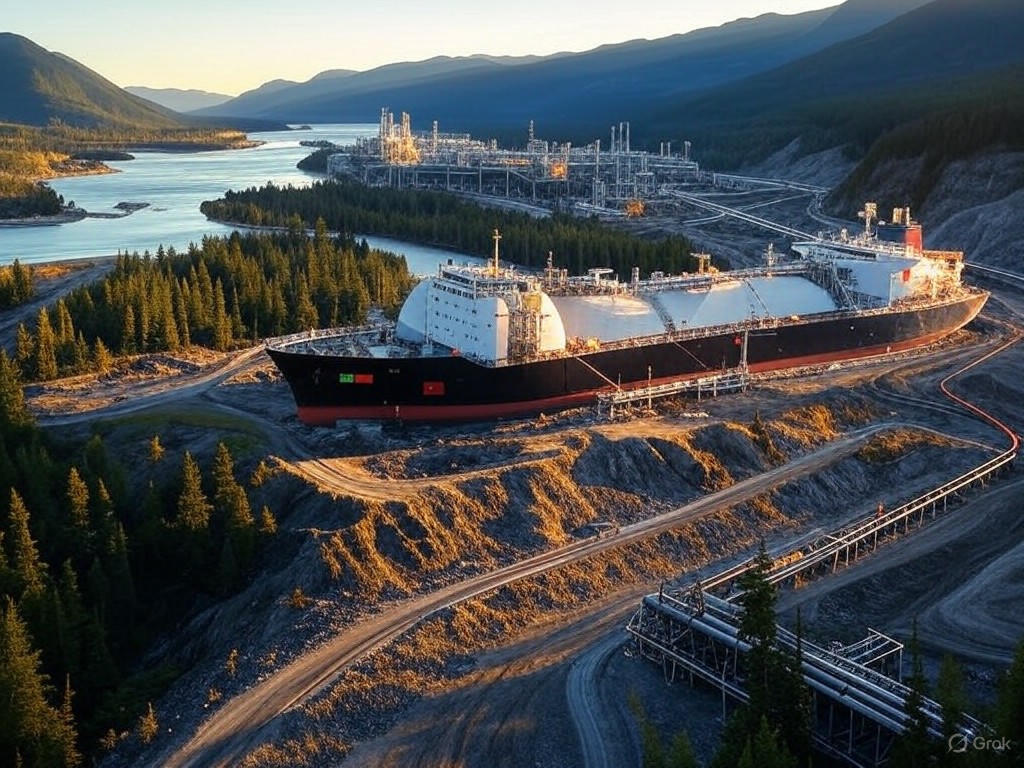BC’s LNG Pipeline: Asia’s Demand vs. Environmental Costs
In the vast, untamed wilderness of British Columbia, where towering peaks pierce the clouds and rivers carve through ancient forests, a new chapter of industrial ambition unfolds. Here, amid the echoes of pioneers and prospectors, lies the promise of liquefied natural gas (LNG) pipelines—a daring venture to quench Asia's insatiable thirst for energy. As global demand surges, British Columbia stands at the crossroads of opportunity and obligation. This editorial evaluates BC’s LNG pipeline projects as a pragmatic response to Asian energy needs, weighing the robust economic gains against the undeniable environmental risks. From a center-right lens, we champion free-market innovation and responsible stewardship, asserting that with measured government oversight, these projects can fuel prosperity without surrendering to undue regulatory burdens.
The stakes are high: Asia's rapid industrialization demands reliable energy sources, while BC's natural resources offer a pathway to mutual benefit. Yet, as stewards of tradition and enterprise, we must ensure that progress serves the greater good, prioritizing market-driven solutions over expansive state intervention. Let us embark on this exploration with the spirit of adventure, for in the balance of economy and environment lies the key to a thriving future.
The Economic Imperative: Fueling Growth in a Global Arena
British Columbia's LNG pipeline initiatives, such as the Coastal GasLink and the proposed Trans Mountain expansion, represent a bold leap into the global energy market. These projects aim to transport vast quantities of natural gas from BC's resource-rich interior to coastal export terminals, ultimately shipping it across the Pacific to meet Asia's booming demand. Countries like China, Japan, and South Korea are modernizing at breakneck speed, with energy consumption projected to rise by 30% by 2030, according to the International Energy Agency's World Energy Outlook. This surge is not merely a statistic; it is a clarion call for free-market economies to deliver.
Economically, the benefits are compelling. The development of LNG pipelines promises thousands of jobs in construction, engineering, and operations, injecting vitality into BC's rural communities. A Wall Street Journal analysis highlights how these projects could add billions to Canada's GDP, with BC alone potentially seeing $40 billion in export revenues over the next two decades. This isn't about government handouts or subsidies; it's about unleashing private investment to create self-sustaining growth. Traditional values of hard work and enterprise shine here: families in places like Kitimat and Prince Rupert could see renewed prosperity, with local businesses thriving on the ripple effects of energy exports.
Yet, we must acknowledge the challenges. Critics point to the volatility of global markets, where fluctuating oil prices could undermine long-term viability. From a center-right perspective, this underscores the need for limited government involvement—perhaps through streamlined permitting processes rather than outright bans—to allow market forces to adapt and innovate. After all, history teaches us that free markets, not bureaucratic decrees, have driven humanity's greatest advancements, from the transcontinental railroads to modern tech revolutions.

Engineers and workers oversee the intricate assembly of the Coastal GasLink pipeline, threading through British Columbia's majestic valleys, symbolizing the marriage of human ingenuity and natural resources.
Navigating Environmental Risks: A Call for Prudent Balance
No discussion of LNG pipeline development can ignore the environmental ledger. British Columbia's pristine landscapes, home to diverse wildlife and indigenous heritage, face potential threats from construction and operations. Pipeline routes may disrupt habitats, increase carbon emissions during extraction, and pose risks of spills or leaks. The Natural Resources Canada environmental assessment estimates that while LNG burns cleaner than coal, the full lifecycle—including transportation—could contribute to greenhouse gas emissions equivalent to several million tons annually.
This is where balance becomes paramount. A center-right approach rejects the alarmism that demands zero risk, instead advocating for technological solutions and voluntary industry standards. For instance, advancements in pipeline integrity monitoring and methane capture could mitigate environmental impacts without imposing crippling regulations that stifle investment. We must draw from traditional values of conservation and responsibility, ensuring that development enhances, rather than erodes, our natural inheritance.
Consider the broader context: Asia's energy demands, if unmet by cleaner alternatives like LNG, might default to coal, exacerbating global pollution. A report from the Center for Global Energy Policy at Columbia University argues that exporting BC's LNG could displace dirtier fuels in Asia, potentially reducing worldwide emissions by up to 10% in key markets. This pragmatic trade-off aligns with free-market principles: by facilitating energy trade, we foster global stability and economic interdependence, all while encouraging private firms to invest in greener technologies.
Of course, environmental stewardship requires vigilance. Indigenous communities in BC, with their deep-rooted connection to the land, deserve a seat at the table—not through mandated quotas, but through collaborative partnerships that respect property rights and local autonomy. Here, limited government intervention can facilitate dialogue, ensuring that projects proceed with community consent and minimal disruption.

Tokyo's bustling harbor at dusk, where LNG tankers from British Columbia dock, illustrating the trans-Pacific energy bridge that powers Asia's economic engine while highlighting the global stakes of resource development.
Evidence and Outcomes: Lessons from the Field
The evidence supporting BC’s LNG ambitions is robust, drawn from real-world data and expert analyses. For starters, the economy keyword resonates in projections from the BC government’s own economic forecasts, which indicate that LNG exports could create over 10,000 direct jobs and support ancillary industries like manufacturing and services. This aligns with historical patterns: regions that embrace energy development, such as Texas in the U.S., have seen sustained growth without succumbing to environmental catastrophe.
Comparatively, environmental risks are manageable. A study by the Peterson Institute for International Economics examines similar projects worldwide, noting that modern pipelines in the U.S. have leakage rates below 1%, thanks to private-sector innovations. In BC, ongoing monitoring programs could adopt these best practices, ensuring that the environment keyword is addressed through adaptive management rather than prohibitive policies.
Yet, we cannot overlook cautionary tales. The 2010 Deepwater Horizon spill in the Gulf of Mexico serves as a stark reminder of what happens when oversight falters—though that incident involved offshore drilling, not pipelines, and was exacerbated by inadequate private accountability. In BC, enforcing strict liability on operators, rather than expanding government bureaucracy, would incentivize safer practices.
A Path Forward: Embracing Opportunity with Wisdom
As we conclude this saga of ambition and restraint, let us affirm that BC’s LNG pipeline projects hold the potential to forge a prosperous future. By responding to Asia's energy demands, we not only bolster our economy but also contribute to global stability, all while upholding traditional values of innovation and fiscal responsibility. The key lies in a center-right framework: empower free markets to drive efficiency, limit government to essential oversight, and foster a culture of stewardship that protects our environment without halting progress.
In the spirit of Alexandre Dumas' swashbuckling tales, where heroes navigate treacherous seas to claim their destiny, British Columbia must chart a course that is bold yet prudent. Let us not shrink from the challenge, but seize it with the confidence that free enterprise, guided by common sense, will prevail. For in the end, the true measure of our legacy is not in what we preserve untouched, but in what we build wisely for generations to come.

